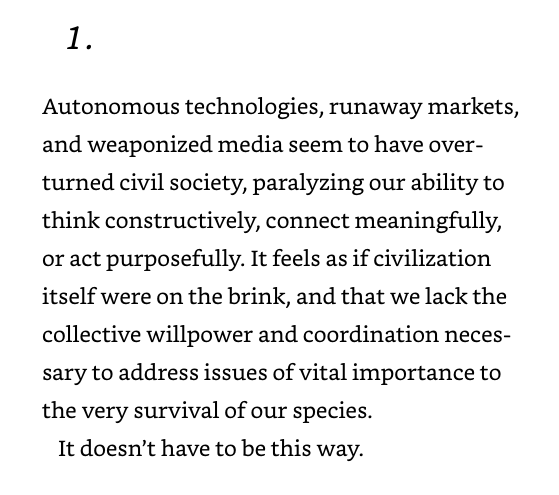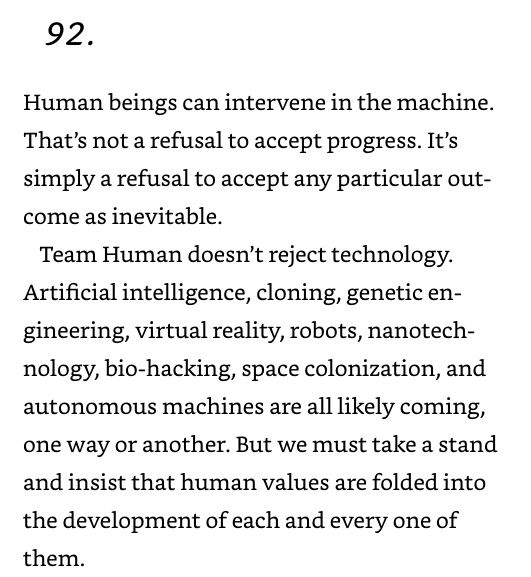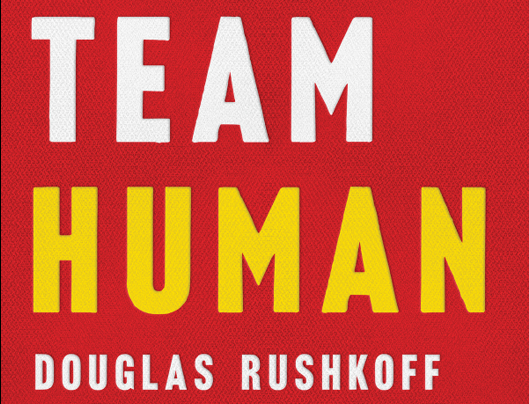My manly fare is working, my vim- and vigor-aphorisms: and verily I did not feed them with flatulent vegetables! But with warrior’s food, conqueror’s food: new appetites I have awakened (Nietzsche, Thus Spake Zarathustra).
Aphorisms are punchy, direct and polemical, aiming to persuade the reader through style rather than mere content. For Friedrich Nietzsche, the aphorism is a writing style for doers, those able to act in the world and not just think about it. He likened his aphorisms to ‘warrior’s food’ in contrast to the ‘flatulent vegetables’ so often served up in philosophy. In masking a wealth of complexity, the aphorism is a tool of persuasion and a call to action.
It is unsurprising, then, that Douglas Rushkoff decides to employ the aphoristic style in his new book Team Human. Rushkoff’s many years as a writer and media theorist have themselves been a call to action for

Deploying ideas from psychology, economics and evolutionary science, Rushkoff argues that humans are naturally cohabiting and mutually reliant creatures. The original vision of the Web put forward by ‘hippies and hackers’, he argues, was reflective of this collective outlook. But digital technologies now have an ‘individualist’ and ‘repressive’ tilt caused by
Yet Team Human also intends to instigate resistance to the antihuman practices of contemporary digital technologies:

Rushkoff’s solution to the problems he describes is to use technology to our advantage to organise and reorient ourselves back to a collective, mutually-reliant situation. Part of this, he argues, requires turning to the institutions that are designed to separate us and remaking them on collective lines through shared values of ‘love, connection, justice [and] distributed prosperity’. This is not to stand in the way of progress, Rushkoff claims, but to look for new ways to share its benefits.
Despite taking great pains to critique enlightenment notions of individuality (particularly how this gives rise to the self-sufficient, economic individual as understood by capitalism), Rushkoff’s book displays many of the tendencies he criticises. This is primarily due to his steadfast adoption of ‘the human’ as his guiding principle, which for the most part goes uninterrogated (even if the notion of individualism does). Although the Enlightenment human is certainly associated with individualism, as he notes, Rushkoff falls into the trap of essentialising human ‘nature’ based on other Enlightenment values of progress, liberalism and the values listed above (love, justice and prosperity). It is precisely these values that require critiquing in any move to a new digital economy, certainly one based on transhumanist or posthumanist understandings (as Rushkoff suggests).
In basing his analysis on scientific notions of humanity, Rushkoff essentialises what it means to be human in a way that limits his overall argument. This isn’t nitpicking — the tendency to appeal to a ‘human nature’ is one that leads to many of the injustices in contemporary society, particularly because this nature is often that of the European, white male. When we appeal to humanity as a collective effort, as Rushkoff does, this should entail critique of more than just mere individualism, but of all those Enlightenment values of scientific progress, liberalism, private property. This would require abandoning the concept of ‘the human’ entirely.
Team Human‘s lack of critical awareness is exacerbated by its polemical, aphoristic style containing no references to secondary material that would usually indicate how writing is indeed an exercise in collectivity. Instead, Rushkoff performs the figure of the all-knowing individual (Enlightenment) author that he spends much of his book critiquing. He thus performs the role of the self-interested/self-determining individual despite having significant issues with it.
This is one of the main problems with much of the discourse on postcapitalist economic transformations, including platform
Perhaps only a diet of ‘flatulent vegetables’ can sustain us as we work through what it means to be human in the postdigital age…
